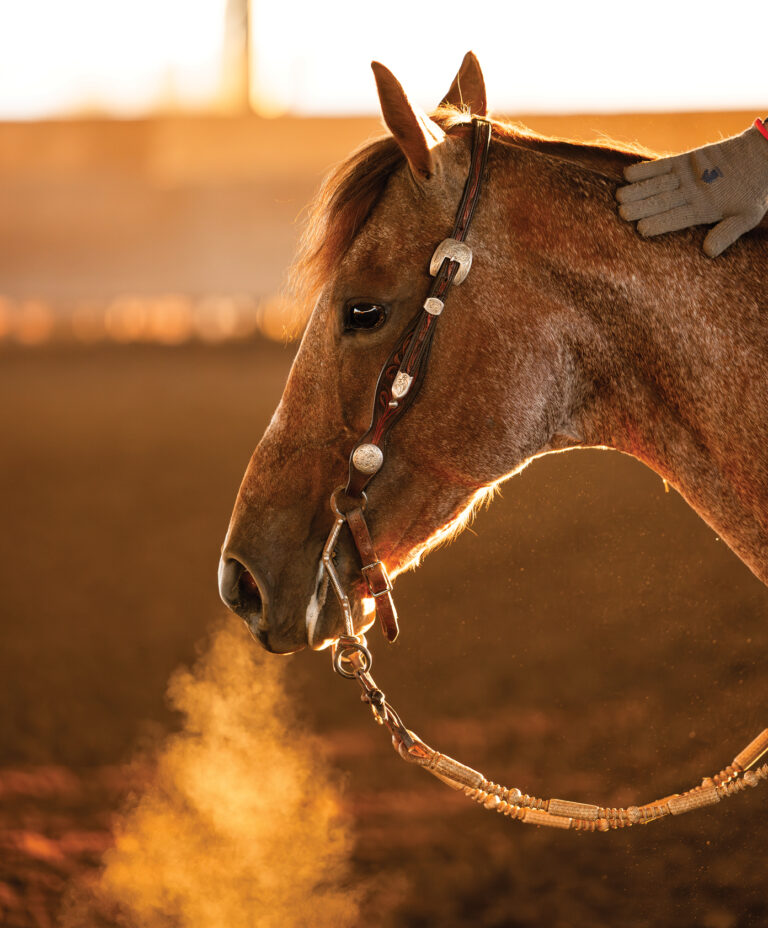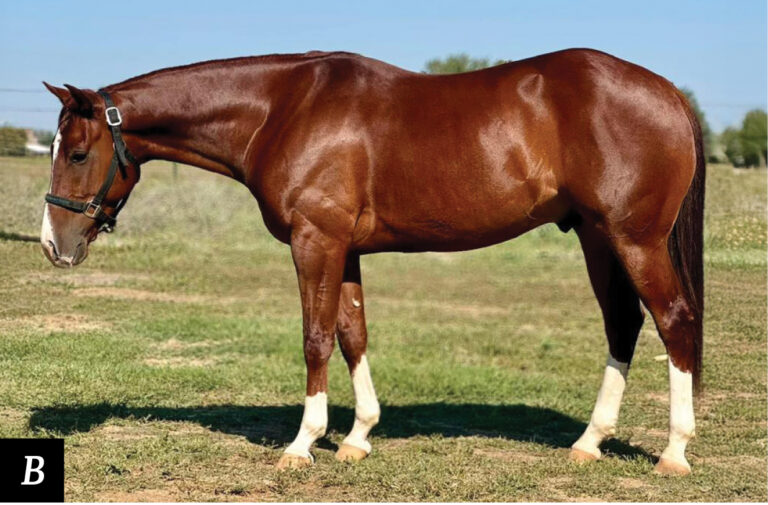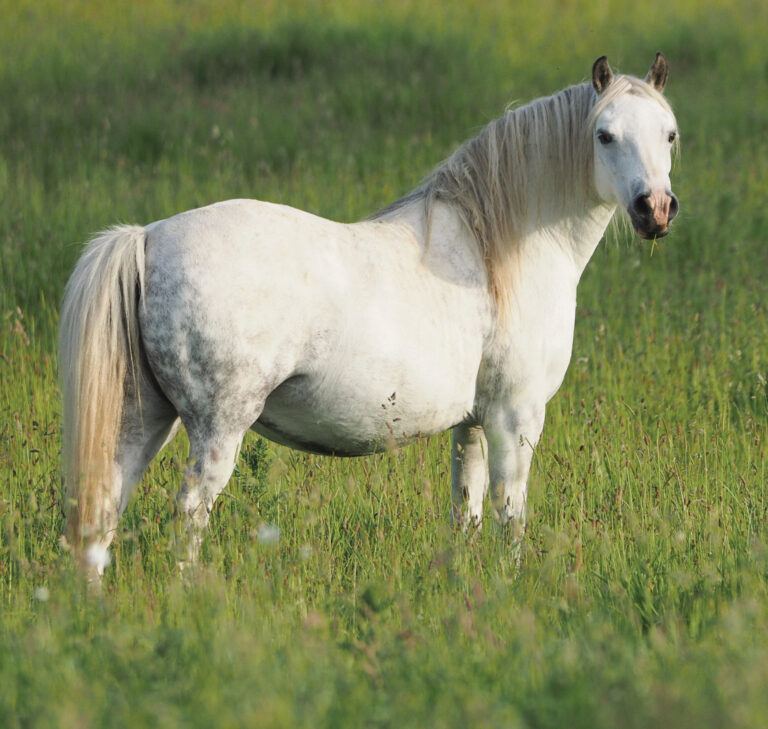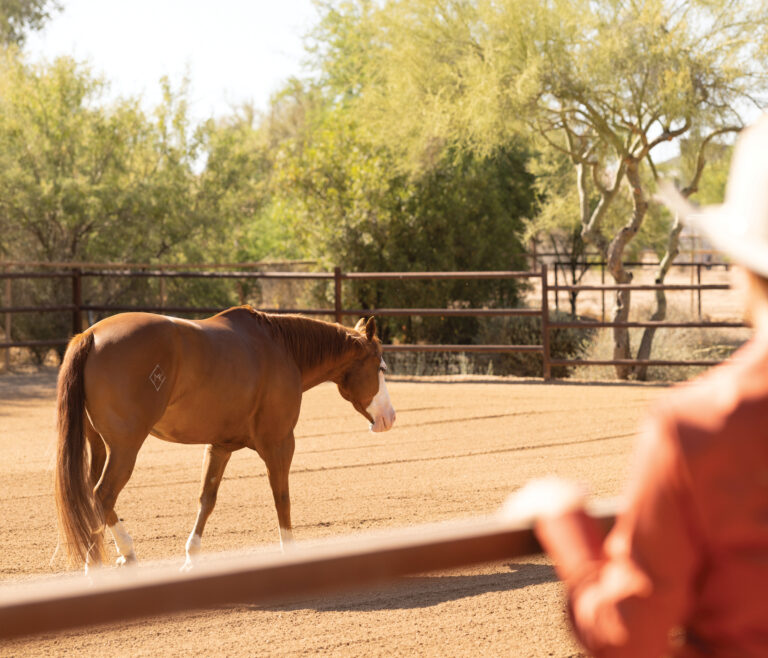There’s a sale on “Super Steed” vitamins at your local vitamins at your local feed store. It’s almost half the price of the daily scoop of “Performance Lift” that you usually give your horse. What should you do? Is one vitamin supplement really that much better than the other?
[READ: Read a Feed Tag]

That’s a great question. Chances are even your veterinarian doesn’t know. In fact, if truth be told, solid science about vitamin and mineral supplementation for horses is in its infancy. Your need more than price comparisons and marketing claims for help making a decision about which supplement to choose.
I’ll explain what role vitamins and minerals play in maintaining your horse’s health, and how basic nutrient requirements are determined. (You may be surprised to learn how little we really know about your horse’s needs.) Then, I’ll fill you in on what we do know about some specific (and important) vitamins and minerals. Finally, I’ll help you decide what supplementation might really be beneficial for your horse, so you can decide what product to choose.
Vitamins and Minerals 101
A vitamin is an organic (contains carbon atoms) compound that’s essential for normal growth and metabolism, and is required in small quantities in the diet because it can’t be synthesized or produced by the organism (your horse). Vitamins have diverse jobs when it comes to keeping your horse’s body functioning. For example, vitamin D aids in absorption of calcium from your horse’s small intestine, while vitamin E scavenges for damaging ?free radicals, and helps to protect the body’s cell membranes.
In contrast to vitamins, minerals have a definition separate from their role in body functioning. A mineral is an inorganic (does not contain carbon atoms) substance that’s stable at room temperature and has an ordered arrangement of atoms; in simpler terms, it’s a solid crystal. Almost 5,000 minerals are known to exist, and of those, a relatively small number are required in the diet of your horse to make sure his body functions the way it should. Certain minerals are critical, such as potassium, which is key to keeping your horse’s muscles contracting and his heart pumping!
What About Requirements?
A great deal remains unknown about specific requirements for many vitamins and minerals. Most recommendations are based on the estimates published by the National Research Council of the National Academies, and come from review of available data by experts on their panel. It’s important to realize that these requirements aren’t necessarily determined by specific studies-so recommendations may change as we learn more. The most recent NRC requirement estimates were published in 2007.
The most difficult thing to decide is whether your horse needs supplementation at all, and if so, how much? If your healthy horse with a moderate work schedule has turn-out time and a diet of good-quality hay, chances are his vitamin and mineral needs are met already. Toxicity is rare, which is why the most common recommendation you’ll hear is to provide a balanced vitamin and mineral supplement as an insurance policy against deficiency. The guide below will help you understand why your horse needs specific vitamins and minerals, where he gets them, and when you might need to add something extra to his daily ration.
Vitamin Guide
Vitamins can be divided into two groups: fat-soluble (dissolve in fat) and water-soluble (dissolve in water). Fat-soluble vitamins include A, D, E, and K, while water-soluble vitamins include vitamin C and the B vitamin group (thiamin or B1, riboflavin, B12, niacin, folacin, pantothenic acid, biotin, and B6).
The B vitamins are considered in a group because they all have a similar function of assisting with cell metabolism. Historically, they were believed to be a single vitamin, until it was discovered that they all have a slightly different chemical composition. For practical purposes, an important distinction is that fat-soluble vitamins have potential for toxicity, while water-soluble vitamins do not. Here is a guide to what we do (and don’t) know about these vitamins.
Vitamin A
What it does: Vitamin A is crucial for proper function of proteins necessary for vision. It plays a role in differentiation of cells during growth, is important for proper muscle function, and helps keep mucous membranes healthy. It’s also involved with reproductive function.
Where it comes from: Beta-carotene, which is converted into vitamin A, is present in fresh pasture and hay. Your horse will store it in his liver for several months, even after it’s no longer available, which will help protect him from deficiency for several months when pasture is no longer available or hay quality suffers.
Needed by 1,100-pound horse: Approximately 15,000 IU per day (1mg of B-carotene is equal to approximately 400 IU of vitamin A).
When he might need more: Vitamin A supplementation is rarely necessary unless your horse has no access to green forage. If you have fertility problems with your mare or if she’s pregnant but lacks access to pasture or good, green hay, vitamin A supplementation might be recommended.
B Vitamins
What they do: Vitamins in this group are all involved with metabolism of carbohydrates, proteins, and fats. They help your horse produce the energy he needs to live from the food he eats.
Where they come from: B vitamins are produced by the bacteria that live in your horse’s large intestine. They’re also found in good-quality pasture and hay.
Needed by 1,100-pound horse: Most, if not all, of your horse’s B vitamin needs are met by production in his own body, and the remaining amount he needs is usually met from hay or pasture. Specific levels for supplementation haven’t been established.
When he might need more: If your horse has poor-quality hooves, supplementation with 20mg per day of biotin may help. B vitamins are believed to have a calming effect, and might be recommended for a nervous horse.
Vitamin C
What it does: Scavenges damaging free radicals (unstable or unhappy molecules that roam the body). Vitamin C plays a role in protecting body cells, and also helps with formation of collagen, an important connective tissue in the body.
Where it comes from: Vitamin C is synthesized from glucose by your horse’s liver.
Needed by 1,100-pound horse: No specific requirements are established, because your horse produces adequate amounts without needing supplementation.
When he might need more: Vitamin C needs can increase during times of stress when your horse’s own body may not be able to keep up with his needs. Vitamin C isn’t well absorbed from his intestinal tract, although levels will increase if it’s fed in fairly large amounts for a period of time. One study showed that older horses may respond better to vaccinations if they’re supplemented with 20g per day of vitamin C.
Vitamin D
What it does: Assists with absorption of calcium from your horse’s small intestine and helps regulate excretion of phosphorus. These functions are critical for maintaining health of bones and joints.
Where it comes from: Vitamin D is produced by your horse’s body when he’s exposed to sunlight (UV radiation). If he grazes outside for 6 to 8 hours per day, he’ll likely meet his needs for this vitamin. Vitamin D also is present in good-quality hay, although amounts will decrease with storage.
Needed by 1,100-pound horse: Approximately 3,000 IU per day.
When he might need more: Exercise can increase needs for vitamin D, so if your hard-working athlete is kept inside with no daily turnout in the sun, supplementation might be suggested. Vitamin D also is important for growing youngsters, so make sure they get plenty of time outside in the sun.
Vitamin E
What it does: Scavenges for damaging free radicals and protects the body’s cells. Supports the immune system and assists with nerve and muscle function. Vitamin E works in concert with selenium (a mineral) to make sure muscles function properly.
Where it comes from: Fresh pasture is the best source of vitamin E. Alfalfa hay is higher in E than other hay sources, although levels of vitamin E decrease with storage over time. D-alpha-tocopheral is the most active form of this vitamin.
Needed by 1,100-pound horse: Approximately 500 IU per day is recommended, although minimum levels aren’t well established.
When he might need more: If your horse has no pasture turnout, he’s likely to need vitamin E supplementation. Hard-working athletes, horses fed high-fat diets, or pregnant mares may benefit from additional vitamin E. Up to 6,000 IU per day may be recommended for certain neurological or muscular diseases.
[READ ABOUT: Vitamin E]
Vitamin K
What it does: Vitamin K has many functions. Most importantly, it’s crucial for proper function of your horse’s blood-clotting mechanisms.
Where it comes from: Vitamin K is present in hay, and is produced by the normal bacteria in your horse’s large intestine.
Needed by 1,100-pound horse: As with vitamin C, no specific requirements are established, because a horse produces adequate amounts without needing supplementation.
When he might need more: If your horse has severe, prolonged intestinal disease, his ability to produce adequate vitamin K could be compromised. Toxicity with a substance that blocks vitamin K (such as warfarin found in rodent poisons) is the most common reason why your horse might need extra vitamin K.
Mineral Guide
As with vitamins, the majority of your horse’s mineral needs are met with a basic ration of pasture and hay. In some instances, the ratio between two minerals is as important as the actual amount available, because one might influence absorption or activity of another. For example, calcium:phosphorus ratios should be maintained at 1.5:1 or higher because excess phosphorus has a negative effect on calcium absorption. And zinc:copper ratios should be 1:3 because these two minerals compete for the same transport mechanisms in the body.
Another important factor that’s gaining attention from nutritionists is the form of minerals provided in the ration. Inorganic minerals (or mineral salts) are believed to be much less easily absorbed by the horse than their organic (paired with proteins or amino acids) counterparts. For example, if you live in an area where selenium supplementation is necessary, it’s wise to choose a supplement containing organic selenium rather than selenite (the inorganic form) for best results.
The guide below will tell you what we know about the most important minerals that should be considered in your horse’s ration.
Sodium Chloride (Salt)
What it does: Helps maintain proper fluid balance in your horse’s body.
Where it comes from: Your horse gets sodium chloride from his basic diet. Most concentrate (grain) rations contain some salt.
Needed by 1,100-pound horse: Daily salt requirements vary widely, so specific recommendations aren?t generally available. It’s estimated he needs between 1 and 6 ounces of salt per day. Your horse does have ?nutritional wisdom? when it comes to his salt needs, however. If a salt block is available, he’ll generally consume what he needs.
When he might need more: Sodium chloride is lost in sweat, and your horse can lose as much as 30g of salt (almost an ounce) during 1 to 2 hours of very hard work. If your horse works hard, especially in hot conditions, it’s especially important that he have sodium chloride available to replenish what he loses.
[READ ABOUT: Feeding Salt to Horses]
Calcium
What it does: Critical for building bone.
Where it comes from: Calcium levels are high in alfalfa hay, where Ca:Phos ratios are often as high as 6:1. Although calcium is present in grass hays, ratios of Ca:Phos can be closer to 1:1, making grass hay somewhat calcium-deficient.
Needed by 1,100-pound horse: 30g to 40g per day.
When he might need more: Calcium is most important during growth and development of bone, both during gestation and after birth. If your horse is fed a diet of grass hay and cereal grain (such as oats), it’s likely that his Ca:Phos ratio is less than 1.5:1, and extra calcium would be advised.
Phosphorus
What it does: Works with calcium to give strength to bone.
Where it comes from: Phosphorus is present in most hays, and is high in cereal grains. Brans are very high in phosphorus.
Needed by 1,100-pound horse: 18g to 29g per day.
When he might need more: As with calcium, phosphorus is most important during growth and development. Senior horses may also be less effective at absorbing phosphorus, and most senior feeds have slightly more of this mineral than other concentrates.
Magnesium
What it does: This mineral plays a role in energy metabolism, muscle contraction, and nerve impulses. It’s also one of the major minerals found in bone.
Where it comes from: Magnesium is present in most hays and grains. Needed by 1,100-pound horse: 7.5g to 12g per day.
When he might need more: Magnesium is most commonly used as a calming supplement, with the belief that a subtle deficiency of this mineral could cause nerve excitation, and that extra magnesium helps relax muscles.Potassium
What it does: Maintains electrical balance across cell membranes and plays an important role in muscle contraction and nerve impulses.Where it comes from: Potassium is found in relatively high amounts in most hays. Needed by 1,100-pound horse: 25g to 32g per day.
When he might need more: Potassium is lost in sweat, and might require supplementation along with other electrolytes in a hard-working horse, particularly when temperatures are high. For horses with the genetic muscle disease known as HYPP, excess potassium is actually a larger problem than deficiency, and care should be taken to minimize potassium in the diet.
Copper
What it does: Plays a role in bone and joint development. Copper also is involved in formation of hemoglobin, the molecule that carries oxygen in your horse’s bloodstream. Without enough copper, your horse may become anemic.
Where it comes from: Copper can be found in most hays, beet pulp, and flax seed. Interestingly, molasses is a very good source of copper and is commonly used in commercial concentrate rations. Needed by 1,100-pound horse: 0.1g to 0.12g per day.
When he might need more: The minerals molybdenum and zinc may interfere with copper metabolism, and excessive iron can interfere with copper absorption. If these minerals are known to be present in high amounts, extra copper might be advised. This can be especially important for growing youngsters, because of the important role copper plays in proper bone and joint development. If your horse’s coat gets sun bleached and turns orange in the summer, it’s possible he’s lacking copper in his diet.
Zinc
What it does: Zinc assists a wide range of different enzymes with their functions. It’s involved in immunity and wound healing, and can play a role in reproductive function.
Where it comes from: Most pasture, hays, and grains contain zinc in adequate levels. Needed by 1,100-pound horse: 0g to 0.5g per day.
When he might need more: Like copper, iron can interfere with zinc absorption. If your horse is exposed to a lot of excess iron, additional zinc may be required in his diet. As with copper, a lack of zinc is believed to cause your horse’s coat to turn orange in the sun.
Selenium
What it does: This mineral is important for many different cell mechanisms. Most important are its roles in muscle and nerve function. It’s essential for proper metabolism of vitamin E.
Where it comes from: Selenium is found in the soil, and your horse gets it from his hay. Some areas of the country have large amounts of selenium in the soil, while others are deficient. Needed by 1,100-pound horse: 3mg per day.
When he might need more: In certain areas of the country, such as the Pacific Northwest, the Great Lakes, and along the eastern seaboard, soils are selenium-deficient. Extra supplementation is required. Of all the minerals known, the range between deficiency and toxicity of selenium is fairly narrow, so this is a mineral that should be considered carefully. A simple blood test can tell you whether your horse has adequate selenium in his diet, and can help guide proper supplementation.
[READ ABOUT: Tying Up in Horses]




